On the internet, you may find many diet plans for weight loss. But you may not find many for weight gain, even though there are a significant number of people who struggle with gaining weight.
Individuals who are underweight or skinny may have an underlying issue which may not always be because they eat too few calories for a prolonged period of time. Being underweight or malnourished may lead to different medical illnesses.
The weight gain equation is quite simple and is based on the amount of calories that you can burn. If your metabolism is high or you vigorously exercise, you may need to consume more calories to meet your body’s requirements. Simply overeating may not be a solution to gain weight. However, spacing your meals as three to six times a day, adding more protein and fat to your diet, and including high-calorie snacks can be some ways to gain weight naturally under a nutritionist’s guidance.
People who consume various supplements and unhealthy foods to gain weight quickly without doing any prior research may face medical problems. Thus, it’s important to be mindful of what you eat and cautious to not make extreme changes to a diet and lifestyle without the advice from a doctor. You may eat healthy foods that can help build muscle and increase your strength. If you are trying to gain some weight, the following guide may help for healthy foods that you can eat 1.
As highlighted earlier, the main concept is to eat more calories than you use during your day. A rough estimate you can aim for is to take in 300 – 500 more calories than what you need. Another general idea is to eat more meals each day, rather than increasing the size of your existing meals. Increasing the amount of good quality fats and proteins in your diet may also be necessary when you’re trying to gain weight. It is recommended not to consume unhealthy fats and junk foods in an effort to put on weight. These types of food will result in weight gain only around your stomach area and thighs and can cause serious long-term issues in the coming years like diabetes, obesity and heart issues. It may also be a good idea to incorporate regular (but not intensive) exercise into your daily routine, as this can help build up your muscle mass and also boost your metabolism and strength 1.
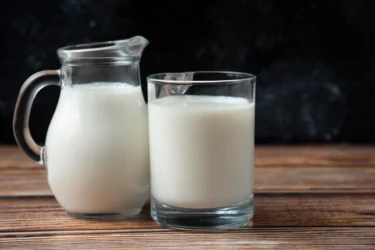
Milk is considered a complete food because it is rich in all nutrients that are essential for our body. It is high in proteins, calcium, carbohydrates, fats, minerals, and vitamins. It is an excellent source of protein that provides both casein and whey proteins. Studies4 have found that milk can help add muscle mass to the body. You can try drinking two glasses of milk per day with a meal or before or after a workout. If you are unable to digest milk as a whole, have it in a form of curd, yoghurt, or buttermilk1.
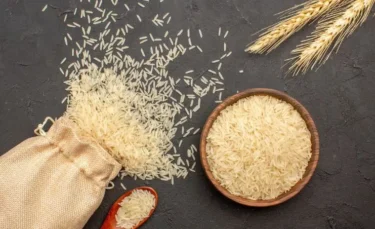
Rice is one of the most convenient and cheap sources of carbohydrates that can be beneficial to gain weight. Rice is also a calorie-dense food that means you can obtain carbohydrates and calories from a single serving. One cup of rice provides about 160 calories that contribute to gain weight 5.
You can have rice with different curries and vegetables that are high in proteins. This is the easiest way to add taste, calories, and a protein boost. Khichdi is a good example of a complete meal and helps to achieve better health and nutritional value while gaining weight.
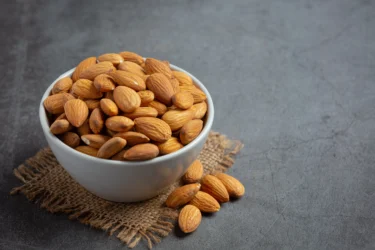
Consuming dried fruits and nuts can be beneficial for weight gain. This super-food contains various antioxidants, proteins, calories, and micronutrients. All types of dried fruit and nut have a naturally high sugar content that may help gain weight. You can eat them raw or roasted or even add them in yogurt, smoothies and milkshakes. A daily handful of dried fruits and nuts such as almonds, walnuts, and cashew can be considered best for weight gain6.
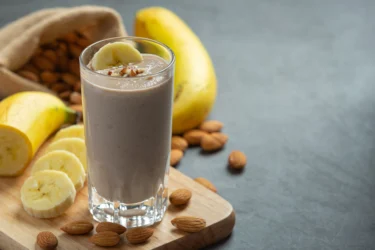
Homemade smoothies are much healthier than ready-made protein supplements. A shake may be most effective at helping to build muscle if taken shortly after a workout. They are also rich in flavour and taste. Here are some examples of homemade smoothies that can help gain weight quickly, such as chocolate banana nut shake, vanilla berry shake, chocolate hazelnut shake, and super green shake. Do make it a point to add some natural sweetness to increase up the calories like dates, honey, jaggery, agave etc3.
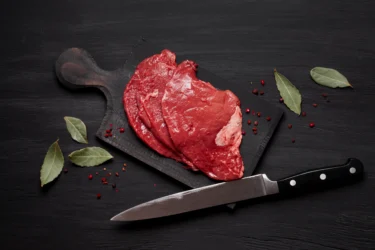
Red meat is a rich source of protein that helps to build muscles and increase weight. It contains leucine and creatinine, nutrients that play a significant role in increasing muscle mass. Steak and other red meats contain both protein and fat, which promote weight gain9. Both fatty and lean muscles provide proteins that can help you to gain weight8. One of the best sources is fat beef dishes brisket. But do remember to keep in mind your other medical parameters while consuming any non-vegetarian meals especially red meat or shelled fish.
Gaining weight can be relatively straightforward for non-vegetarians, given their wide array of food choices. However, it poses more challenges for vegetarians and can be even more difficult for those who are on restrictive diets. Vegetarians and those who are lactose intolerant face the issue of limited options. To address this, here are some recommended food items you may use. To boost calorie intake in these dietary preferences, consider incorporating soy milk, almond milk, coconut milk, rice milk, nuts, seed butters, tofu, olives, avocado, and vegetable oils into your meals.
Dr. Rajeev Singh, BAMS
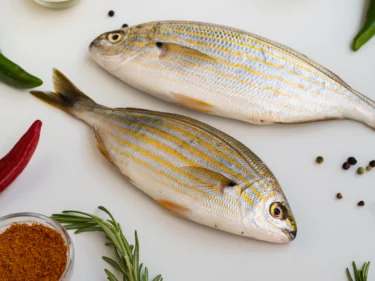
Fatty fish such as salmon is rich in essential fatty acids and proteins. They help to gain weight and also boost your immunity. Omega-3 present in these fishes is considered the best source that is significant for weight gain10. You can prepare different dishes from salmon like steamed fish, fried fish, and smoked salmon. In India, Surmai and Ravas are the closest to Salmon.
Also Read: Is Mounjaro Approved for Weight Loss? Here’s What Our Endocrinologist Says
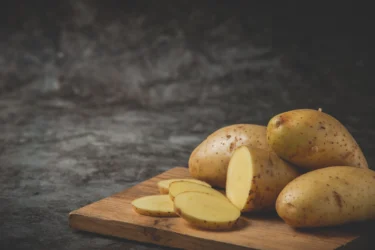
Starchy foods such as potatoes, sweet potatoes and corn are a popular and tasty option for quick weight gain. It is a cost-effective option that provides extra calories for your body. These foods contain carbohydrates and calories that increase muscle glycogen stores. Studies have found that many of these starchy foods also contribute to essential nutrients and fibre, as well as resistant starch, which can help nourish your gut bacteria and help gain weight7, 12.
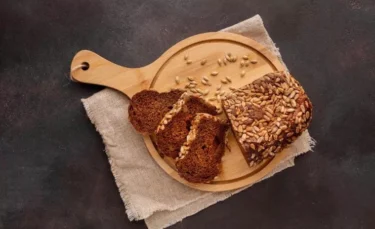
The simple whole grain bread is a good source of carbohydrates that will increase your weight. They can be a well-balanced meal when prepared with protein sources like eggs, meat, and cheese or paneer. The live, good bacteria in sourdough feed bacteria in the gut that can strengthen your immune system13. Sour dough breads can be combined with avocado for a healthy meal balance.
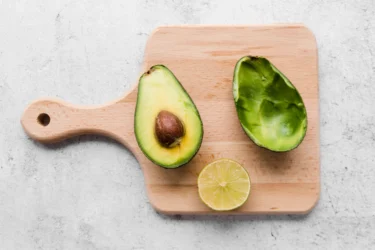
Avocados are an excellent source of fats, antioxidants, vitamins, and fibres14. You can add avocado to your main meal, sandwiches, and other dishes which can be beneficial for weight gain3. Guacamole is a very common avocado dish which comes close to the Indian or Asian cusine.
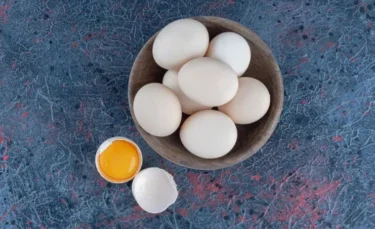
Whole eggs are a valuable option for weight gain as they are full of proteins, calcium, and healthy fats2. They are muscle building foods and are readily available everywhere . It is beneficial to eat the whole egg, as the egg yolk is most nutritious.
Studies11 have shown that increasing the intake of fats and proteins might help you gain weight naturally. To my knowledge, food items like red meats, chicken, fish, beans, whole milk, eggs, cheese, full-fat yoghurt, nuts, butter, and olives may help in gaining weight while maintaining your health. You may try these options in your meals in different combinations.
Dr. Siddharth Gupta, B.A.M.S, M.D (Ayu)
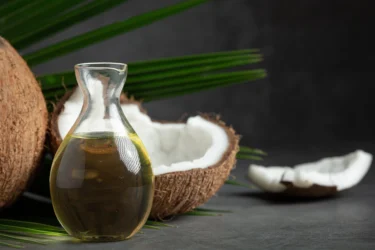
Healthy oils are extremely calorie-dense and do not come with the downsides of other unhealthy oils. You can add these oils to salad dressings, as a seasoning base, or for cooking. Avocado oil, extra virgin olive oil and coconut oil are three healthy oils that can help increase your caloric intake. Another method to incorporate healthy oil into your diet is to add one of these oils with a small amount of butter to your morning coffee. It is delicious and healthy!
Also Read: Natural Home Remedies To Reduce Belly Fat
The possibility of gaining weight overnight is a hoax or myth. A healthy, consistent diet, strength training and a set of different weight gain exercises all play their part in helping you gain weight. Out of this, diet and food have an important role. The following meal-plan can be incorporated for your weight gain diet:
Include food items like whole-grain bread slices with peanut butter and honey; a glass of milkshake; a medium-sized seasonal fruit; milk with chia seeds or sabja and oats; poached eggs; avocado toast. Avoid caffeine products like tea or strong coffee. You can also incorporate Indian foods like paratha or thepla with curd or idli or dosa with sambar and chutney. with curd or idli or dosa with sambar and chutney. or dosa with sambar and chutney.
You can add food items like chicken pasta made with leafy green vegetables, feta cheese, olive oil, tomato and avocado; egg, cheese and salad wraps; lentil, vegetable and barley soup; chicken and noodle stir fry; a bowl of rice with vegetables and fish; chicken rice with corn; chapati, chicken curry and a bowl of yoghurt or Indian staple food Khichdi made with rice and dals and vegetables as a one pot meal.
You can add your choice of rice/chapati as preferred and have it with fish, chicken, vegetables. A bowl of chicken soup with corn may also be added. Do add some salad to balance the fibre intake for the day..
Dried fruits have a great potential in helping gain weight. A handful of almonds, cashews or walnuts every day may be a healthy snacking option. Seeds like sunflower seeds and whole-grain crackers with hummus dip serve as a great snack option.
Also Read: Mounjaro (Injection): Uses, Side Effects, Dosage, and How It Works
There are many foods and supplements available that help with weight gain. Instead of trying to take in large amounts of sweets or fatty foods, choosing high-calorie foods that provide energy and build muscle mass may be beneficial. Regular, age-appropriate exercise along with a healthy and calorie-rich diet may be the best way to put on weight in a healthy manner. Avoid snacking in between meals, ensure that you are always hydrated and maintain a healthy, nutritious diet only. You will need a little perseverance as gaining weight is not a sprint, it takes patience, but the results will be worth the wait.
Also Read: Acidity Problems? 21 Home Remedies That Can Help
Yes, fruits can be a part of a weight gain diet as they provide natural sugars, vitamins and minerals. High-calorie fruits like bananas, avocados and mangoes can contribute to healthy weight gain. Pairing fruits with other calorie-dense foods can create nutritious and calorie-rich meals.
Yes, nuts are beneficial for weight gain as they are calorie-dense and packed with healthy fats, protein and fibre. Incorporating nuts into your diet can provide an easy and nutritious way to increase daily calorie intake.
Adding healthy fats to your diet for weight gain can be done by incorporating foods like avocados, nuts, seeds, olive oil, coconut oil and fatty fish into your meals. These sources of healthy fats not only increase calorie intake but also offer many health benefits.
Yes, dairy products can aid in healthy weight gain. Full-fat dairy options like whole milk, yogurt and cheese are rich in calories, protein and calcium, making them excellent choices for those looking to gain weight in a healthy manner.
Yes, including protein-rich foods in a weight gain diet is essential as protein is crucial for muscle development and repair. Foods like lean meats, poultry, fish, eggs, beans, lentils and dairy products are excellent sources of protein.
Yes, smoothies can be helpful for weight gain when prepared with calorie-dense ingredients. Incorporating fruits, nuts, seeds, yogurt, milk and protein powders into smoothies can make them nutritious and calorie-rich meals.
Yes, whole grains are good for weight gain as they provide complex carbohydrates, fibre and essential nutrients. Foods like whole-grain bread, pasta, brown rice and quinoa can be excellent additions to a weight gain diet.
Yes, you can gain weight healthily with plant-based foods by focusing on calorie-dense options like avocados, nuts, seeds, legumes, whole grains and plant-based protein sources like tofu and tempeh.
You can incorporate more calories into your meals for weight gain by adding healthy fats, protein-rich foods and calorie-dense ingredients like nuts, seeds, avocados and dried fruits. Eating frequent, balanced meals and snacks throughout the day can also help increase calorie intake.
1.. Health Direct Australia. What to do if you are underweight [Internet]. www.healthdirect.gov.au. 2019 [cited 2025 Apr 15]. Available from: https://www.healthdirect.gov.au/what-to-do-if-you-are-underweight
2. Emrani AS, Beigrezaei S, Zademohammadi F, Salehi-Abargouei A. The effect of whole egg consumption on weight and body composition in adults: a systematic review and meta-analysis of clinical trials. Systematic Reviews. 2023 [cited 2025 Apr 17]. Available from: https://pmc.ncbi.nlm.nih.gov/articles/PMC10353215/
3. Dietary Advice about Gaining Weight in a Healthy Way [Internet]. North Tees and Hartlepool NHS Foundation Trust. 2023 [cited 2025 Apr 15]. Available from: https://www.nth.nhs.uk/resources/dietary-advice-about-gaining-weight-in-a-healthy-way/
4. Berkey CS, Rockett HRH, Willett WC, Colditz GA. Milk, Dairy Fat, Dietary Calcium, and Weight Gain. Archives of Pediatrics & Adolescent Medicine [Internet]. 2005 Jun 1 [cited 2025 Apr 15];159(6):543. Available from: https://jamanetwork.com/journals/jamapediatrics/fullarticle/486041
5. Calorie Content Food List Starches and Grains: 80 calories per serving [Internet]. Calorie Content Food List . [cited 2025 Apr 15]. Available from: https://www.nutrition.va.gov/docs/UpdatedPatientEd/CalorieContentFoodList2018.pdf
6. Services D of H & H. Weight and muscle gain [Internet]. www.betterhealth.vic.gov.au. [cited 2025 Apr 15]. Available from: https://www.betterhealth.vic.gov.au/health/healthyliving/weight-and-muscle-gain#bhc-content
7. Welter G, Rokuski S. NUTRITION COUNSELING -CAMPUS HEALTH SERVICE -HEALTH PROMOTION Gaining Weight: A Healthy Plan for Adding Pounds [Internet]. Gaining Weight: A Healthy Plan for Adding Pounds. [cited 2025 Apr 15]. Available from: https://www.health.arizona.edu/sites/default/files/weight_gain_healthy_ways_to_add_pounds.pdf
8. Barr B, Levitt DE, Gollahon L. Red meat amino acids for beginners: A narrative review. Nutrients. 2025 [cited 2025 Apr 17]. Available from: https://pmc.ncbi.nlm.nih.gov/articles/PMC11946737/
9. Khodayari S, Sadeghi O, Safabakhsh M, Mozaffari-Khosravi H. Meat consumption and the risk of general and central obesity: the Shahedieh study. BMC Research Notes. 2022 [cited 2025 Apr 17]. Available from: https://pmc.ncbi.nlm.nih.gov/articles/PMC9628015/
10. Swanson D, Block R, Mousa SA. Omega-3 fatty acids EPA and DHA: health benefits throughout life. Advances in Nutrition. 2012 [cited 2025 Apr 17]. Available from: https://pmc.ncbi.nlm.nih.gov/articles/PMC3262608/
11. National Academies Press (US). Factors that influence body weight. Weight Management – NCBI Bookshelf. 2004 [cited 2025 Apr 17]. Available from: https://www.ncbi.nlm.nih.gov/books/NBK221834/
12. Bojarczuk A, Skąpska S, Khaneghah AM, Marszałek K. Health benefits of resistant starch: A review of the literature. Journal of Functional Foods. 2022 [cited 2025 Apr 17]. Available from: https://www.sciencedirect.com/science/article/pii/S1756464622001645
13. Lau SW, Chong AQ, Chin NL, Talib RA, Basha RK. Sourdough microbiome comparison and benefits. Microorganisms. 2021 [cited 2025 Apr 17]. Available from: https://pmc.ncbi.nlm.nih.gov/articles/PMC8306212/#sec4-microorganisms-09-01355
14. Powell J. Avocados – the nutrition source. The Nutrition Source. 2024 [cited 2025 Apr 17]. Available from: https://nutritionsource.hsph.harvard.edu/avocados/
Disclaimer: The information provided here is for educational/awareness purposes only and is not intended to be a substitute for medical treatment by a healthcare professional and should not be relied upon to diagnose or treat any medical condition. The reader should consult a registered medical practitioner to determine the appropriateness of the information and before consuming any medication. PharmEasy does not provide any guarantee or warranty (express or implied) regarding the accuracy, adequacy, completeness, legality, reliability or usefulness of the information; and disclaims any liability arising thereof.